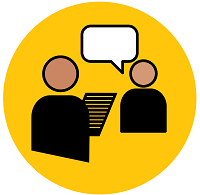Getting Help from Librarians
One place that you can go for help finding legal information is a library. You may visit your local public library or a law library. A public library in your community likely has internet access and may also have print books about the law. The materials in a law library will mostly be focused on the law and the law library may have computers you can use to access special legal research tools. Law libraries are not as common as public libraries, but several exist in Iowa. If you are not near a law library, you can also check to see whether any local academic libraries are open to the public. They may have some resources that contain legal materials.
Remember that librarians cannot give you legal advice. Many law librarians have law degrees, but they are still not allowed to give you legal advice, including deciding which law applies to your case. In many libraries and law libraries, though, librarians can direct you to appropriate types of resources and show you how the resources work.
Examples of law libraries in Iowa that are open to the public are:
- The State Law Library of Iowa
- Address: 1007 E. Grand Ave., Des Moines, IA 50319
- Phone: 1-800-248-4483
- Drake University Law Library
- Address: Opperman Hall, 2604 Forest Ave., Des Moines, IA 50311
- Phone: 515-271-3189
- The University of Iowa Law Library
- Address: 220 Boyd Law Building, Iowa City, IA 52242
- Phone: 319-335-9002
For Iowans who live on the Western border, Creighton Law Library in Omaha is also open to the public. If you are interested in visiting one of these libraries or requesting reference assistance, contact the library or visit their website for more information on their hours, services, and visitor policies. Academic law libraries, like those at Creighton, Drake, and the University of Iowa, give priority to the students, faculty, and staff at their institutions, so they may only be able to provide you with limited assistance, especially when school is in session.
Libraries may have reference services available in person, over the phone, and/or online (such as a chat or email service). For example, you can contact the State Law Library of Iowa through their Ask a Librarian form.
When asking for help from librarians:
- Be as specific as possible about what you are looking for, such as identifying the resource you are trying to find (a form, a case, a statute, etc.) or the type of research you want to do (for example, searching for cases online).
- Let the librarian know of any limitations on your research if you are calling or reaching out online, such as that you do not have access to the internet where you live or that you are not able to visit the library in person.
- If you have already tried to find resources or help from other places, let the librarian know where you looked and the places you contacted.
